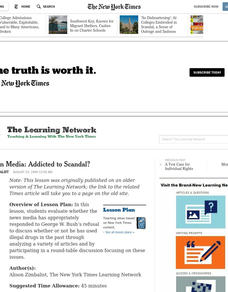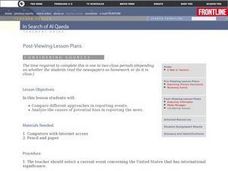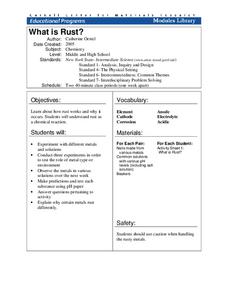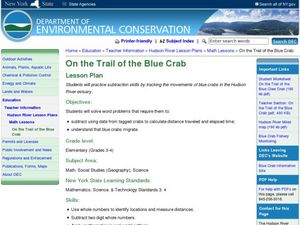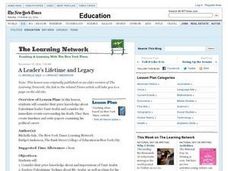Curated OER
The Outrage of Ordinary Men: Pennsylvania's Role in the Great Railroad Strike of 1877
Students study the events that surround the Great Railroad Strike of 1877. In this historical lesson students work in groups to analyze documents, determine the facts and present a summary of their findings to the class.
Curated OER
American Media: Addicted to Scandal?
Students examine media coverage of George W. Bush's refusal to answer questions regarding past illegal drug usage in the 1999 campaign. They consider the role of rumor, scandal, audience and relevance in political media coverage.
Curated OER
Andrew Jackson
In this online interactive history worksheet, students respond to 6 short answer and essay questions about Andrew Jackson. Students may check some of their answers on the interactive worksheet.
Curated OER
Searching the Net
Students create a Native American Nation flip book. In this Native American lesson, students choose one of four Native American Nations: The Iroquois, Hopi, Seminoles, Sioux. They research them on the Internet using teacher given...
Curated OER
Turtles
Students discuss turtles. They read books about turtles, make turtle puppets, research turtles on the Internet and then create a turtle fact booklet.
Curated OER
A Penny for Abe
Students explore Abraham Lincoln through stories and poems. They also explore him being on the penny.
Curated OER
The Medium is the Message: Covering the Final Chapter of the Elian Gonzalez Story
Learners discuss the case of Elian Gonzalez and collaborate in small groups to act as editors in assigning facts, quotes, and details to be included in a newspaper article. They judge the accuracy of their predictions.
Curated OER
Extraordinary Explorers
Students, using the Internet, B41460research facts about explorers and travelers. They also state what places they have explored and share with the class.
Curated OER
Underground Travelers
Students are introduced to new vocabulary associated with the Underground Railroad. Using primary sources, they evaluate the railroad's impact on society in the past and today. They also make a judgment about the morality of the railroad...
Curated OER
Journalism: Potential Bias
Learners investigate a current event involving the United States from different journalistic viewpoints. They compare a Western newspaper with one from the Middle East and submit written evaluations noting agreements and disagreements in...
Curated OER
Let's Celebrate Our Land!
Students investigate Woody Guthrie's beliefs. In this citizenship instructional activity, students research and discuss the beliefs of Woody Guthrie and write down several facts that they learned.
New York State Education Department
TASC Transition Curriculum: Workshop 11
You'll C-E-R a difference in classroom achievement after using a helpful lesson. Designed for economics, civics, government, and US history classes, participants practice using the CER model to craft arguments about primary and secondary...
Curated OER
Neighborhood or Slum? Snapshots of Five Points: 1827-1867
How has your local neighborhood changed throughout recent history? Young researchers evaluate census data, images, and primary source descriptions describing the living situation in the antebellum Five Points neighborhood. They consider...
EngageNY
Congruence, Proof, and Constructions
This amazingly extensive unit covers a wealth of geometric ground, ranging from constructions to angle properties, triangle theorems, rigid transformations, and fundamentals of formal proofs. Each of the almost-forty lessons is broken...
Curated OER
Historical Perspective and the contributions to the development of national and world-view of Arkansas
Students study the development of national and world-views of Arkansas. They discuss how people and events have shaped the image of Arkansas.
Curated OER
The Civil War
Although we currently focus on Abraham Lincoln's positive contributions in creating a more equal society, the truth is that Lincoln was actually a controversial character in his time! After studying the Civil War, give your high...
Curated OER
Water Cycle Reading and Writing
After listening to a story about the water cycle, learners create their own versions of this tale. This is a great way to have your class review the concepts of evaporation, condensation, precipitation, and runoff.
Curated OER
Readings in Hudson River Natural History
Reading and understanding informational text is a key element to understanding every discipline. Elementary learners read three different articles focused on various animals and habitats in the Hudson River. They answer comprehension...
Cornell University
What Is Rust?
Why do metals rust differently? Scholars experiment with metal combinations in a hands-on activity. They create unique environments with different metals and compare the rate and amount of rust for each.
Curated OER
First Grade American Civilization: February
First graders examine and discuss the Boston Tea Party, Paul Revere, Redcoats, Thomas Jefferson and the Declaration of Independence. They conduct an experiment done by Benjamin Franklin, solve a word puzzle written in code by Ben...
Curated OER
1846: Portrait of America in the Time of Don Pasquale: An Historic Look at American Life During the 1840's
Students construct an historical timeline extending from 1840-1850. They discuss various people, places, and events on their timelines.
Curated OER
On the Trail of the Blue Crab
Third graders read the article "Blue Claw," discuss crab migration, and look at a map of the Hudson River. They complete a worksheet where they must use subtraction to determine the distance migrating crabs travel.Web links, article, and...
Curated OER
Add and Subtract with Hudson River shipping
Rivers aren't just a place for animals to live, they also provide industrial transportation. The class will examine the Hudson River on a map, discuss all the commercial vessels that use the River to transport materials, then complete a...
Curated OER
A Leader's Lifetime and Legacy
In this lesson plan, students consider their prior knowledge about Palestinian leader Yasir Arafat and consider the immediate events surrounding his death. They then create timelines and write papers examining his political career.



